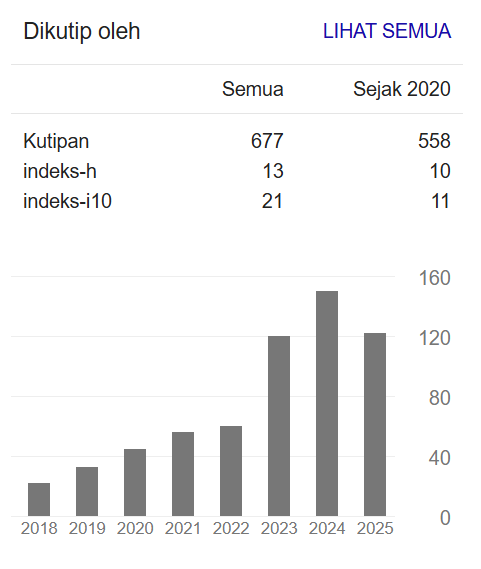INVESTIGATING THE ARGUMENTS OF NECESSARY OF EXISTENCE (WĀJIB AL-WUJŪD) IN SUHRAWARDĪ’S PHILOSOPHY BASED ON AL-TALWĪḤĀT AND ḤIKMAH AL-ISHRĀQ
DOI:
https://doi.org/10.20871/kpjipm.v10i1.311Keywords:
Al-Talwīḥāt, Ḥikmah al-Ishrāq, Nūr al-Anwār, Suhrawardī, Wājib al-WujūdAbstract
Suhrawardī has presented arguments to support the existence of wājib al-wujūd in many of his works. One of the most fundamental of these arguments, which also has a forward-looking feature, is the one he presents in his books al-Talwīḥāt and Ḥikmah al-Ishrāq. To prove the existence of God, Suhrawardī devised three arguments in al-Talwīḥāt and one argument in Ḥikmah al-Ishrāq, all of which are interpretations of the ṣiddīqīn argument. In this article four of Suhrawardī’s arguments, three of them in al-Talwīḥāt and one of them in Ḥikmah al-Ishrāq are reviewed. the main aim of this study is to analyze and explain Suhrawardī’s arguments, due to their importance in philosophy and theology, with the descriptive-analytical method and using library-based collecting data. The arguments presented in the al-Talwīḥāt are succinct, and what made these claims essential was the evaluation of their robustness and content. The significance of his first and third arguments in this book is that they do not require the denial of the vicious circle as a precondition, and by assuming the likelihood of both the vicious circle and infinite regress, the necessity of existence is demonstrated. On the other hand, his argument in Ḥikmah al-Ishrāq, which, like his second argument, is based on the refutation of the vicious circle and infinite regress, includes innovative features and should be investigated thoroughly.
Downloads
References
Arhami, Mokhtar, Saeed Geravand, and Mansour İmanpour. 2023. “Ways to Reach the Supreme Being in Mullah Sadra’s Thought.” Journal of Philosophical Investigations 17 (44): 45–62. https://doi.org/10.22034/jpiut.2022.52506.3288.
Davar, Mohamad Mahdi, and Fatemeh Mohamadi. 2023. “Analysis of the Proofs of God’s Existence in Avicenna’s Isharat Wa Tanbihat and Suhrawardi’s Talwihat.” In Conference: Suhrawardi and Revival of Fahlavi Philosophy (Philosophy of Ancient Iran). Iran: Iranian Research Institute of Philosophy.
———. 2021. Treatise on Proving the Necessity of Existence. Tehran: Noure Sokhan.
Haqqi, Ali, and Rafideh Qazikhani. 2017. “God and the World of Creation in Shaykh Ishrāq’s View.” Essays in Philosophy and Kalam 49 (1): 27–52. https://doi.org/10.22067/philosophy.v0i0.16433.
Harrison, Peter. 2024. “The Forgotten Proof: The Existence of God and Universal Consent.” The Journal of Religion 104 (1): 45–78. https://doi.org/10.1086/727614.
Imanpoor, Mansoor. 2008. “Sohrawardi’s View on God’s Knowledge.” Journal of Philosophical Theological Research 9 (3): 3–17. https://doi.org/10.22091/pfk.2008.256.
Lala, Ismail, and Reham Alwazzan. 2023. “Necessary Existence and Necessary Mercy: Ibn ‘Arabī’s Reformulation of Ibn Sīnā’s Ontological Proof.” Religions 14 (8): 1016. https://doi.org/10.3390/rel14081016.
Liu, Xin. 2024. “On Proofs for the Existence of God: Aristotle, Avicenna, and Thomas Aquinas.” Religions 15 (2): 235. https://doi.org/10.3390/rel15020235.
Maftouni, Nadia, and Mohamad Mahdi Davar. 2022. “The Theological Foundations of Suhrawardi’s Utopia.” Nasim-e-Kherad 8 (1): 9–26.
———. 2023. “Suhrawardi’s Approach to the Treatment of the Diseases of the Soul.” Nasim-e-Kherad 9 (1): 25–44.
Novaković, Aleksandar. 2023. “Why We Do Not Need Demonstrative Proof for God’s Existence to Know That God Exists: Robert Nozick’s Case for the Existence of God.” Neue Zeitschrift Für Systematische Theologie Und Religionsphilosophie 65 (4): 464–86. https://doi.org/10.1515/nzsth-2023-0007.
Sajidi, Ali Mohammad. 2005. “The Agency of God in Sohravardi’s Philosophy.” Journal of Faculty of Letters and Humanities (Tabriz) 48 (194): 41–73.
Shīrāzī, Quṭb al-Dīn. 2001. Sharh Ḥikmah Al-Ishrāq. Edited by Abdullah Nourani and Mehdi Mohaghegh. Tehran: University of Tehran.
Shirmohammadi, Leila. 2018. “Arguments to Prove God from the Point of View of Sheikh Ishraq and Leibniz.” Thesis, Tehran: Islamic Azad University.
Sīnā, Ibn. 1997. Ishārāt wa al-Tanbīhāt, Qom: Nashr al-Balāgah.
Suhrawardī, Shihāb al-Dīn. Majmu‘ah Muṣanafāt Shaykh Ishrāq. Vol. 1. Tehrān: Pajuishgah ‘Ulūm Insānī wa Muṭāli‘āt Farhangi Press.
———. 2022b. Majmu‘ah Muṣanafāt Shaykh Ishrāq. Vol. 2. Tehrān: Pajuishgah ‘Ulūm Insānī wa Muṭāli‘āt Farhangi Press.
———. 2022c. Majmu‘ah Muṣanafāt Shaykh Ishrāq. Vol. 3. Tehrān: Pajuishgah ‘Ulūm Insānī wa Muṭāli‘āt Farhangi Press.
———. 2002d. Majmu‘ah Muṣanafāt Shaykh Ishrāq. Vol. 4. Tehrān: Pajuishgah ‘Ulūm Insānī wa Muṭāli‘āt Farhangi Press.
Ṭūsī, Naṣīr al-Dīn al-. 1997. Sharh Ishārāt wa al-Tanbīhāt. Qom: Nashr al-Balāgah.
Additional Files
Published
How to Cite
Issue
Section
License
Copyright (c) 2024 Mohamad Mahdi Davar

This work is licensed under a Creative Commons Attribution 4.0 International License.





























